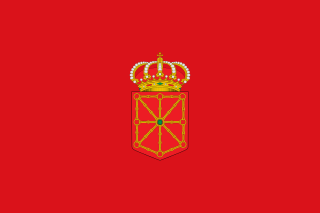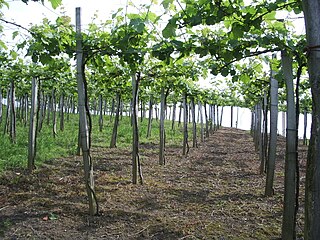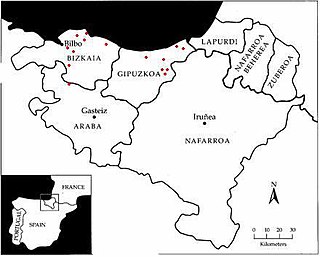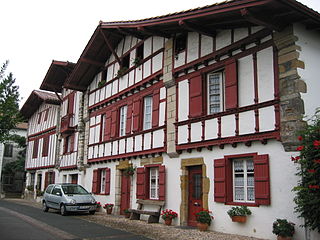
Basque is the only surviving Paleo-European language spoken in Europe, predating the arrival of speakers of the Indo-European languages that dominate the continent today. Basque is spoken by the Basques and other residents of the Basque Country, a region that straddles the westernmost Pyrenees in adjacent parts of northern Spain and southwestern France. Basque is classified as a language isolate. The Basques are indigenous to and primarily inhabit the Basque Country. The Basque language is spoken by 806,000 Basques in all territories. Of these, 93.7% (756,000) are in the Spanish area of the Basque Country and the remaining 6.3% (50,000) are in the French portion. Basque is considered the most spoken language isolate in the world.
The Basques are a Southwestern European ethnic group, characterised by the Basque language, a common culture and shared genetic ancestry to the ancient Vascones and Aquitanians. Basques are indigenous to, and primarily inhabit, an area traditionally known as the Basque Country —a region that is located around the western end of the Pyrenees on the coast of the Bay of Biscay and straddles parts of north-central Spain and south-western France.

Navarre, officially the Chartered Community of Navarre, is a landlocked foral autonomous community and province in northern Spain, bordering the Basque Autonomous Community, La Rioja, and Aragon in Spain and Nouvelle-Aquitaine in France. The capital city is Pamplona. The present-day province makes up the majority of the territory of the medieval Kingdom of Navarre, a long-standing Pyrenean kingdom that occupied lands on both sides of the western Pyrenees, with its northernmost part, Lower Navarre, located in the southwest corner of France.

Basque nationalism is a form of nationalism that asserts that Basques, an ethnic group indigenous to the western Pyrenees, are a nation and promotes the political unity of the Basques, today scattered between Spain and France. Since its inception in the late 19th century, Basque nationalism has included Basque independence movements.

The Basque Nationalist Party, officially Basque National Party in English, is a Basque nationalist and regionalist political party. The party is located in the centre of the political spectrum.

The Basque Country is the name given to the home of the Basque people. The Basque Country is located in the western Pyrenees, straddling the border between France and Spain on the coast of the Bay of Biscay.

Txakoli or chacolí is a slightly sparkling, very dry white wine with high acidity and low alcohol content produced in the Spanish Basque Country, Cantabria and northern Burgos in Spain. Further afield, Chile is also a minor producer.

Lazkao is a town and municipality located in the Goierri region of the province of Gipuzkoa, in the Basque Country.

Aitor "Txiki" Begiristain Mujika is a Spanish former professional footballer who played mainly as a left winger but also as a forward, currently director of football of English club Manchester City.

Bengoetxea, Bengoechea or Bengoetchea is a Basque surname which is common all throughout the Basque Country, especially in cities such as: Murelaga, Lizarza, Alkitza, Aizarna, Aulestia, Igeldo, Oiartzun, Aia, Olaberria, Lazkano, Berrobi (Tolosa) and Zizurkil in Gipuzkoa; Valley of Orozko, Mungia, Zeberio, Mundaka and Galdakao in Biscay; and in Arrieta and Baranbio (Amurrio) in Alava.

A sagardotegi is a type of cider house found in the Basque Country where Basque cider and traditional foods such as cod omelettes are served. Modern sagardotegis can broadly be described as a cross between a steakhouse and a cider house.

Basque surnames are surnames with Basque-language origins or a long, identifiable tradition in the Basque Country. They can be divided into two main types, patronymic and non-patronymic.

Leire Olaberria Dorronsoro ; born 17 February 1977) is a Spanish racing cyclist from the Basque Country. She won the Bronze medal in the Women's points race at the 2008 Summer Olympics, finishing behind Marianne Vos (Netherlands) and Yoanka González (Cuba).

The Basque Country, also called the Basque Autonomous Community, is an autonomous community in northern Spain. It includes the Basque provinces of Álava, Biscay, and Gipuzkoa. It also surrounds an enclave called Treviño, which belongs to the neighboring autonomous community of Castile and León.
Leire is a Basque feminine given name that is derived from the name of the Monastery of San Salvador of Leyre in Navarre, Spain. It was among the top 10 most popular names given to newborn girls in Basque Country in Spain in 2011.

The 2013 Tour of the Basque Country was the 53rd running of the Tour of the Basque Country cycling stage race. It started on 1 April in Elgoibar and ended on 6 April in Beasain, and consisted of six stages, including a race-concluding individual time trial. It was the ninth race of the 2013 UCI World Tour season.
Basque Country women's national rugby union team is the national and/or representative women's rugby union team of the Basque Country. It is organised by the Basque Rugby Federation and has been active since 1994–95. Unlike the men's team, the Basque Country women's team have only played a small number of international games. They regularly play friendlies against club and provincial teams.
José Antonio Vivó Undabarrena was a politician assassinated by the armed Basque separatist group ETA on February 6, 1979.

Eukene Larrarte is a Spanish cyclist, who currently rides for UCI Women's Continental Team Laboral Kutxa–Fundación Euskadi.



















